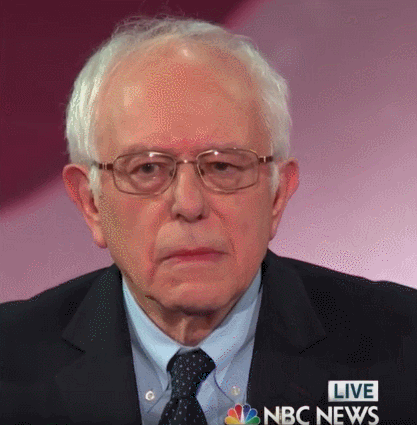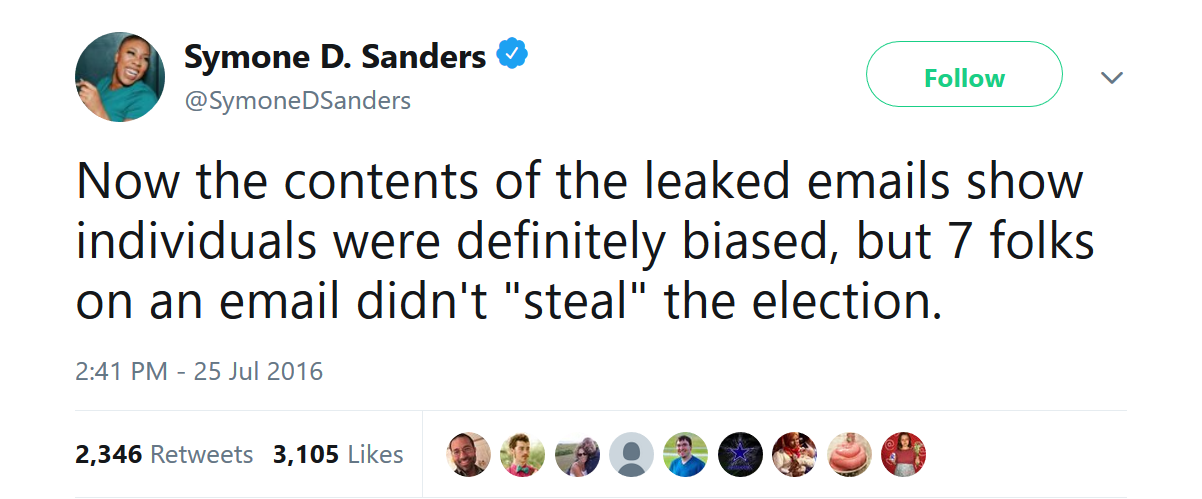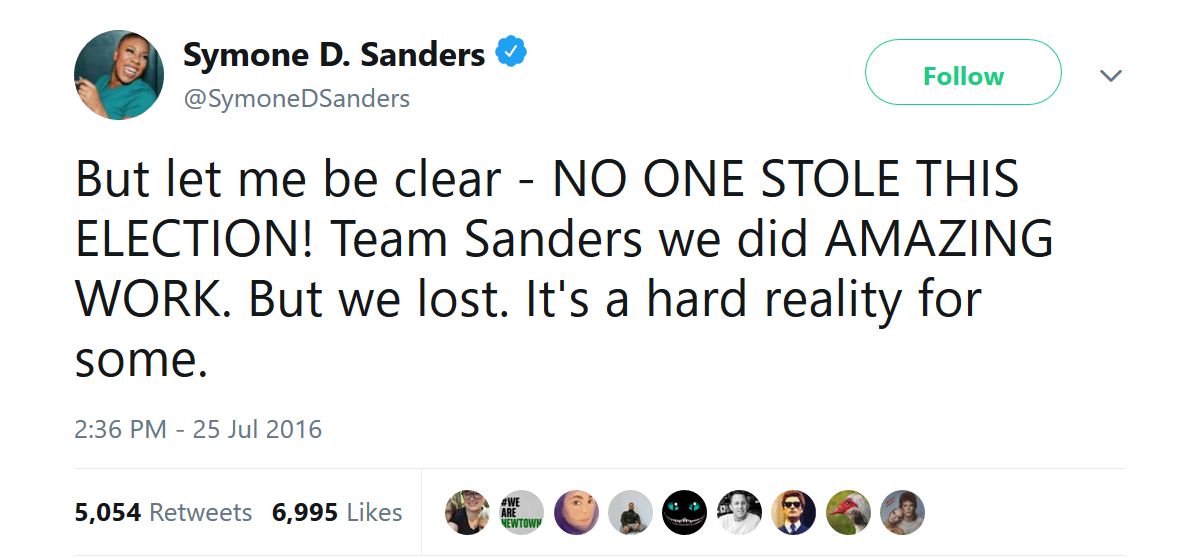
1. There are emails that suggest Sanders had some kind of non-aggression agreement with Hillary Clinton's campaign.
In May 2015, when Clinton's campaign manager, Robby Mook, was informed that Sanders said somewhat unflattering things about Clinton's wealth in an interview with CNBC, he wrote back the following:
"This isn't in keeping w the agreement. Since we clearly have some leverage, would be good to flag this for him. I could send a signal via Welch -- or did you establish a direct line w him?"
A non-aggression agreement would explain why more than a few of Clinton's scandals were not addressed by Sanders. Case in point: he could've informed voters that, in 2011, after the Kingdom of Saudi Arabia had donated millions of dollars to the Clinton Foundation, Clinton's State Department approved a weapons deal worth billions of dollars with the country, even though Clinton said, in a leaked 2009 State Department memo, that it is the world's largest source of funds for Sunni terrorist groups.
Instead of addressing the above facts, Sanders said things like he "hates and detests these 30-second negative ads" and "the American people are sick and tired of hearing about [Clinton's] damn emails" (1, 2).
In the end, despite the fact that Clinton is literally a corrupt, warmongering serial liar, Sanders decided to endorse her:
"Hillary Clinton will make an outstanding president, and I am proud to stand with her today."

2. Ultimately, Sanders's actions suggest that he didn't really want to become president.
After Clinton became the Democratic nominee, a lot of Sanders's supporters, including me, wanted him to either run for president as an independent or to accept Jill Stein's offer to continue his candidacy via the Green Party. Here's why, theoretically, he could've won that way:
He polled a lot better against Donald Trump than Clinton did.
He outraised Clinton in campaign funds even though he didn't accept corporate money.
In 2016, 39% of Americans identified as independents, while 31% identified as Democrats and 28% identified as Republicans.
Clinton and Trump are the most disliked presidential candidates in at least three decades.
According to numerous polls, the majority of Trump's supporters supported him because they disliked Clinton, while the majority of Clinton's supporters supported her because they disliked Trump.
Sanders's explanation for ending his run for president was that he didn't want to split the vote. But, considering all of the above, I'd say, theoretically, his chance of winning was big enough to risk a Trump presidency. Not to mention, Clinton's presidency would've almost certainly been a disaster as well. Plus, if Sanders really was that worried about splitting the vote, he could've informed voters about the need for ranked-choice voting:
Then there is the fact that, after election fraud occurred in Arizona's primary, instead of demanding a revote or that voting hours be extended, Sanders simply said:
"People should not have to wait five hours to vote, and what happened yesterday in Arizona is a disgrace. I hope that every state in this country learns from that and learns how to put together a proper election where people can come in and vote in a timely manner and then go back to work."
Don't get me started on his press release or these Tweets from his former national press secretary following the DNC email leak:


The thing is, as long as Sanders doesn't really address the problem of electronic voting, and that there's a very good chance it cost him the election, he's helping the establishment stay in power, and I doubt he doesn't know that.
3. Sanders's record is not nearly as anti-establishment as many people think it is.
Some of his more recent absurdities:
During the final weeks of Tim Canova's race for Congress against former DNC chair Debbie Wasserman Schultz, who presumably played a major role in rigging the 2016 Democratic primary, Sanders kind of stopped supporting Canova. He didn't even answer his calls anymore.
When Sanders was asked if having to reach 15% in the polls in order to get into the upcoming presidential debates is a fair threshold, he replied that it's "probably too high." That, however, is a huge understatement, considering that a lot of those polls were literally rigged, and that the so-called Commission on Presidential Debates is really a private corporation run by Democrats and Republicans that effectively tries to prevent independent and third-party candidates from ending the two-party system.
Sanders claimed that Russia interfered with the 2016 U.S. presidential election, without providing any evidence to support this extremely serious allegation, and despite the fact that there are numerous things suggesting otherwise.

- Sanders claimed that Syrian President Bashar al-Assad was behind the recent alleged sarin gas attack in Syria...without providing any evidence to support this extremely serious allegation, and despite the fact that there are numerous things suggesting otherwise.
While Sanders didn't say he's in favor of Trump's possibly illegal military strike against Syria, he didn't really condemn it either.
Update

- Instead of leaving the Democratic Party, which (a) drowns in corruption, (b) sabotaged his campaign, (c) screwed over its more progressive wing, and (d) doesn't think it needs to change its direction, Sanders decided to go on tour with the new DNC chair, Tom Perez, in order to rally grass-roots support for the party.
So, even though the Democratic Party has shown time and time again that it is a dead end for progressive movements, Sanders continues to sheepdog for the party, when he could, for example, use his time, energy, and influence to grow the Green Party (or even to create a people's party).
And no, going third party or independent would not be a waste of time. Trump already broke quite a few of his campaign promises, so I think it's safe to assume that a significant amount of his 2016 supporters will support a different candidate/party next time. In fact, since a lot of them dislike the Democratic Party as well, I'd say many will at least be open to supporting independent/third-party candidates.
Then there's ranked-choice voting, which was recently passed in Maine (though only for local elections). If it gets passed in enough other states, it could just be a total game changer.
Another game changer would be the participation of independent/third-party candidates in the presidential debates, which, thanks to this recently won lawsuit, could actually happen next time.
Also, because of Trump's presidency and social media, more and more people are becoming politically active, meaning a lot of progress could be made in the next three and a half years, even without Sanders's help.

Update

Yep, people need to wake up....
✅ @kevinsarpei, I gave you an upvote on your first post! Please give me a follow and I will give you a follow in return!
Please also take a moment to read this post regarding bad behavior on Steemit.